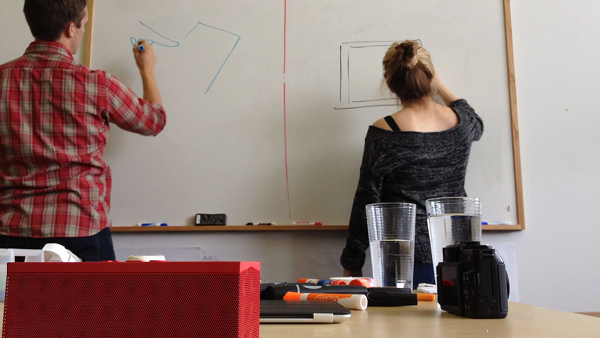
The IxDA here in Chicago was nice enough to ask me to speak on the topic of mentorship last month. It’s a topic I felt more than comfortable chatting about since we have a strong belief in mentorship here at Fuzzy Math, both for those inside and outside the walls of our design studio.
Modeled after building client relationships
In many ways mentoring is about building lasting one-on-one relationships. I like to call it one-on-one networking and it’s actually how we prefer to do business with our perspective and current clients. We are small studio, focused on user experience design and strategy. We tend to build long term relationships with our clients, starting small and working with them over a long period of time. This model, as simple as it sounds, fits the culture of our firm and has worked for the past 3+ years.
And simple as it sounds, mentorship is very similar to how we build these relationships with our client. Mentorship is about making a connection with someone in your industry (maybe design, maybe UX) with more or less experience. Don’t think about it as solely someone that needs to be your senior. Instead think about it as an opportunity to share information and offer guidance. Sometimes I learn just as much from someone career transitioning from Architecture or Social Work as they do from me.
My experience with mentors
Early on my experience with mentors was through managers , bosses, or even the CEOs of the companies where I worked. It wasn’t formal but more about trying to figure out how they got from point A to Z in their career and if I wanted to follow a similar path. Over time it moved to my coworkers and peers in the UX community. We wouldn’t solely discuss UX topics, but also our various careers arcs and where we wanted to head. Today my mentors are really a mix of clients, peers running similar businesses, and even employees or people in the UX community.
Formal Mentorship at Fuzzy Math
We practice formal and informal mentorship with the single biggest example of formalized mentorship coming through our internship program. I say “program” since its evolved over time with more guidelines but it’s far from 100% baked. Nor need it be. To start we have our interns establish their own goals for the internship and then review progress on a weekly basis. We ask them to keep a diary of their notes, questions, goals, and accomplishments. We’ve started to use a model of 3-month paid internships. The first month of the internship is pure observation – we invite the intern to every meeting and ensure they are drinking from the FM fire hose. This initial month is to see how UX is done here at FM and to provide exposure to as many activities and deliverables as possible. The second month is spent shadowing other team members and performing work in parallel. None of the work is meant to be delivered to clients and our interns aren’t engaged directly on client projects. As we shift into the final month we start to focus on delivery. Our interns create designs and present them to other team members. We focus the final month on helping our interns create client-ready deliverables and understand some of the demands of project work without being in the critical path.
Mentoring employees is another natural part of our processes here at Fuzzy Math. We believe strong in employee empowerment and execute this through a series of goal planning exercises. We’ll talk about this in another post but there is nothing that says “mentorship” shouldn’t be strongest within your own organization.
Informal Mentorship
My mentorship outside of Fuzzy Math involves being available for members of the IxDA and IAI. People contact me as they need feedback in a number of areas:
- How to career transition (or if to career transition at all)
- The state (pros/cons) of the various graduate programs in the Chicago
- Feedback on their portfolio or book
- How UX is striated into specialties and which mean what
Overall it’s exciting to be part of a craft (and career) that has experienced so much growth — and one where I can tell people their chances of getting hired are very high.
How to find and structure a mentorship
For formal mentorship, find an organization that supports mentorship (school/alumni, professional, etc.) and then find someone that seems genuinely interested in mentorship and the responsibilities that come with it. For informal, just reach out (via LinkedIn, email, etc.) to someone. Generally people are a lot nicer than we think.
But for either have an agenda and purpose. Ensure you are respecting peoples’ time. The single biggest piece of advice I can offer is to create a set of goals and review those with your mentor. And then track those goals along the way to see ensure both parties acknowledge what is and isn’t working.
If you think someone here at Fuzzy Math could help please email us at hello@fuzzymath.com. We have experience mentoring on UX, Small business/Entrepreneurship, Web development, and graphic design.
Or reach out to two former interns, now employees, Christa Louks and Carl Duffield.